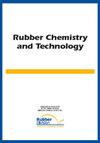SYNERGIZED THERMAL STABILIZATION EFFECT OF ACID ACCEPTORS ON PEROXIDE CROSSLINKED CHLOROPRENE RUBBER
IF 1.5
4区 工程技术
Q4 POLYMER SCIENCE
引用次数: 1
Abstract
Chloroprene rubber (CR) vulcanizates have been widely used in various industrial applications due to their excellent mechanical properties such as elasticity, elongation at break, and superior resistance to chemicals, flame, etc. Because of the specific microstructures of CR, it is mainly vulcanized by metal oxide vulcanizing systems. However, CR undergoes rapid thermal degradation when it is crosslinked by peroxide curing systems at high temperatures. Although peroxide curing systems such as dicumyl peroxide (DCP) have attracted tremendous attention in the vulcanization of various saturated and unsaturated elastomers to achieve high-performance engineering properties, it is avoided for CR due to the occurrence of thermal decomposition, which is catalyzed by hydrochloric acid (HCl) vapors released during crosslinking. In the present work, by exploiting different acid acceptors, attempts have been made to design a vulcanizing system composed of inorganic–organic materials as acid acceptors to increase the potential of hindering the thermal decomposition in the CR phase. The designed system provides an accelerated system with a high crosslink density and mechanical properties comparable to metal oxide cured CR with elongation at break of ∼1000% and tensile strength of 10.3 MPa. The extent of thermal stabilization in the CR phase provided by the designed acid acceptor system was studied with thermogravimetric analysis.酸受体对过氧化物交联氯丁橡胶的协同热稳定作用
氯丁橡胶(CR)硫化胶因其优异的力学性能,如弹性、断裂伸长率以及优异的耐化学品性、阻燃性等,已被广泛应用于各种工业应用中。由于氯丁橡胶的特殊微观结构,它主要通过金属氧化物硫化体系进行硫化。然而,当CR在高温下通过过氧化物固化体系交联时,它会经历快速的热降解。尽管过氧化二异丙苯(DCP)等过氧化物固化体系在各种饱和和不饱和弹性体的硫化中引起了极大的关注,以实现高性能的工程性能,但由于交联过程中释放的盐酸(HCl)蒸汽催化热分解的发生,CR避免了这种情况。在本工作中,通过开发不同的酸受体,试图设计一种由无机-有机材料组成的硫化体系作为酸受体,以增加阻碍CR相中热分解的潜力。所设计的系统提供了一种加速系统,具有高交联密度和与金属氧化物固化CR相当的机械性能,断裂伸长率为~1000%,拉伸强度为10.3MPa。通过热重分析研究了所设计的酸受体体系在CR相中的热稳定程度。
本文章由计算机程序翻译,如有差异,请以英文原文为准。
求助全文
约1分钟内获得全文
求助全文
来源期刊

Rubber Chemistry and Technology
工程技术-高分子科学
CiteScore
3.50
自引率
20.00%
发文量
21
审稿时长
3.6 months
期刊介绍:
The scope of RC&T covers:
-Chemistry and Properties-
Mechanics-
Materials Science-
Nanocomposites-
Biotechnology-
Rubber Recycling-
Green Technology-
Characterization and Simulation.
Published continuously since 1928, the journal provides the deepest archive of published research in the field. Rubber Chemistry & Technology is read by scientists and engineers in academia, industry and government.
 求助内容:
求助内容: 应助结果提醒方式:
应助结果提醒方式:


